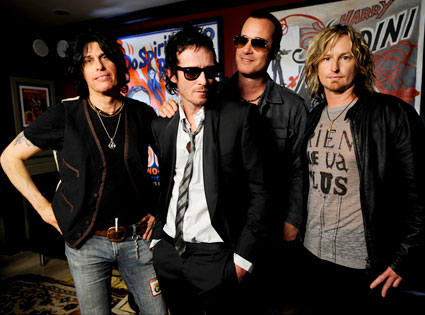| B i o g r a p h y |
 Stone Temple
Pilots were able to turn alternative rock into stadium rock;
naturally, they became the most critically despised band of their era.
Accused by many critics of being nothing more than ripoff artists who
pilfered from Pearl Jam, Soundgarden, and Alice in Chains, the
bandmates nevertheless became major stars in 1993. And the influence of
those bands was apparent in their music, although Stone Temple Pilots
did manage to change things around a bit. STP were more concerned with
tight song structure and riffs than punk rage. Their closest
antecedents were not the Sex Pistols or Hüsker Dü; instead the band
resembled arena rock acts from the '70s - they made popular hard rock
that sounded good on the radio and in concert. No matter what the
critics said, Stone Temple Pilots had undeniably catchy riffs and
production; there's a reason why over three million people bought their
debut album, Core, and why their second album, Purple, shot to number
one when it was released.
Stone Temple
Pilots were able to turn alternative rock into stadium rock;
naturally, they became the most critically despised band of their era.
Accused by many critics of being nothing more than ripoff artists who
pilfered from Pearl Jam, Soundgarden, and Alice in Chains, the
bandmates nevertheless became major stars in 1993. And the influence of
those bands was apparent in their music, although Stone Temple Pilots
did manage to change things around a bit. STP were more concerned with
tight song structure and riffs than punk rage. Their closest
antecedents were not the Sex Pistols or Hüsker Dü; instead the band
resembled arena rock acts from the '70s - they made popular hard rock
that sounded good on the radio and in concert. No matter what the
critics said, Stone Temple Pilots had undeniably catchy riffs and
production; there's a reason why over three million people bought their
debut album, Core, and why their second album, Purple, shot to number
one when it was released.
Following the success of Purple and its accompanying tour, the band took some time off, during which the group's lead singer, Scott Weiland, developed a heroin addiction. In the spring of 1995, he was arrested for possession of heroin and cocaine, and was sentenced to a rehabilitation program. Following his completion of the program, Stone Temple Pilots recorded their third album. Released in the spring of 1996, Tiny Music...Songs From the Vatican Gift Shop, entered the charts at number four. Shortly after its release, Stone Temple Pilots announced that Weiland had relapsed and entered a drug rehabilitation facility, thereby canceling the group's plans for a summer tour. Weiland's drug problems and the group's inability to support Tiny Music with a tour meant that the album couldn't replicate the success of its predecessors - by the end of the summer, it had fallen out the Top 50 and had stalled at platinum, which was considerably less than what the group's two previous albums achieved.
Still battling his personal demons, Weiland recorded a 1998 solo album, 12 Bar Blues, while the remaining members of STP recruited vocalist Dave Coutts to record a self-titled LP under the band name Talk Show. To the surprise of many, Stone Temple Pilots then reunited, although shortly after completing 1999's No. 4 Weiland was sentenced to a year in a Los Angeles county jail for violating his probation, which stemmed from an earlier conviction for heroin possession. Even so, a newly rejuvenated Stone Temple Pilots and a sober Weiland emerged stronger than ever during the new millennium. The band got back to basics with Shangri-La Dee Da, released in summer 2001. Two years later, STP issued the ambitious greatest-hits package Thank You. The audio-only edition featured 15 tracks - 13 hits spanning the group's entire career, an acoustic version of "Plush" dating from 1992, and the new track "All in the Suit That You Wear" - while a special CD/DVD format included three hours of videos, live performances, and behind-the-scenes footage.
Stone Temple Pilots took another break between 2003 and 2008, during
which time Weiland found renewed success as the frontman of Velvet
Revolver. After clashes with his bandmates resulted in his exit from
the group, Weiland reunited with STP and embarked on a successful
reunion tour in 2008, with ticket sales reportedly totaling $230,000
per show. The band returned to the studio one year later, emerging in
2010 with the release of its self-titled sixth album.